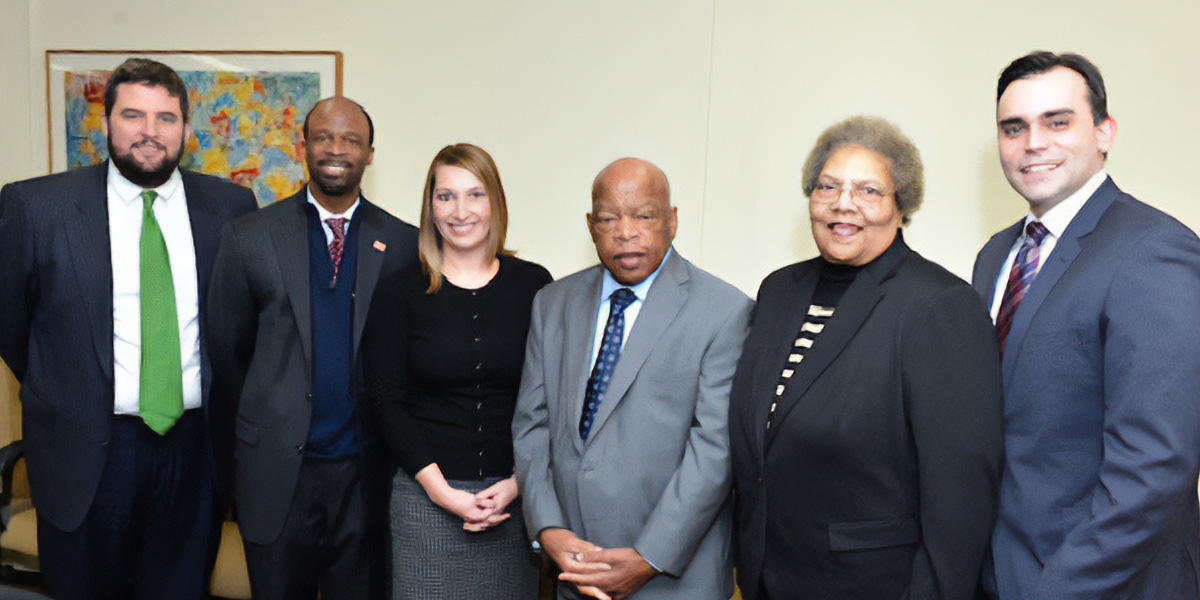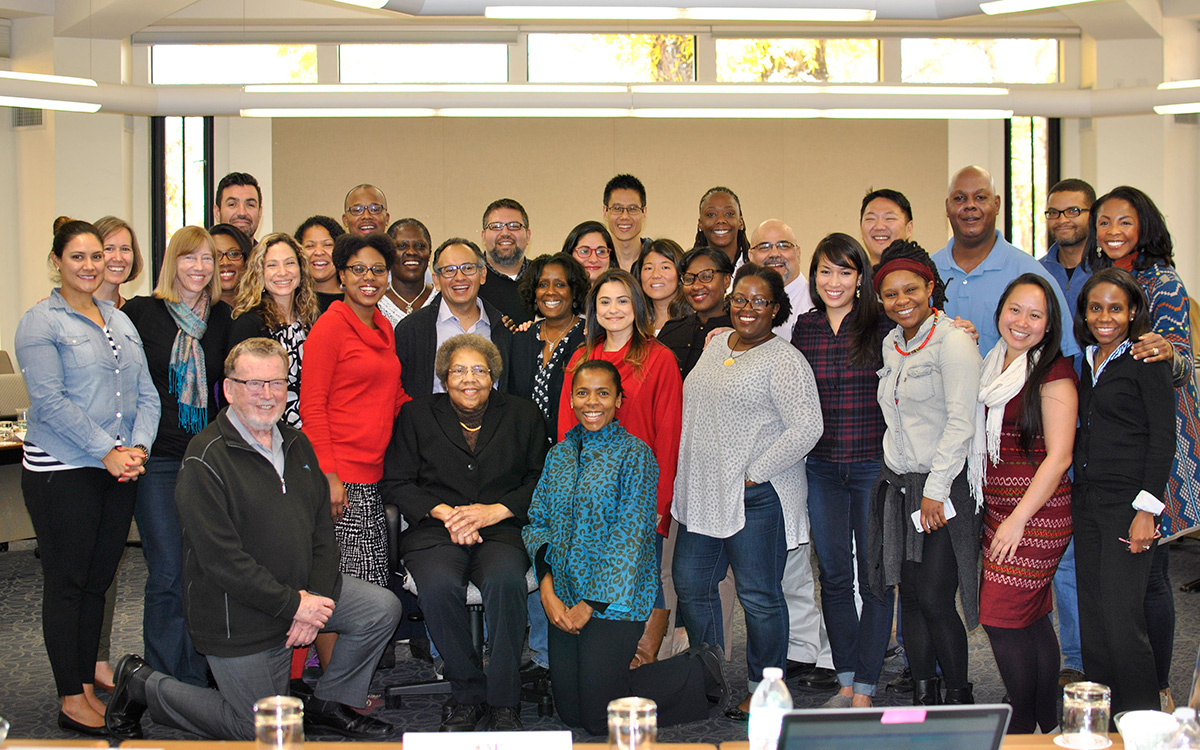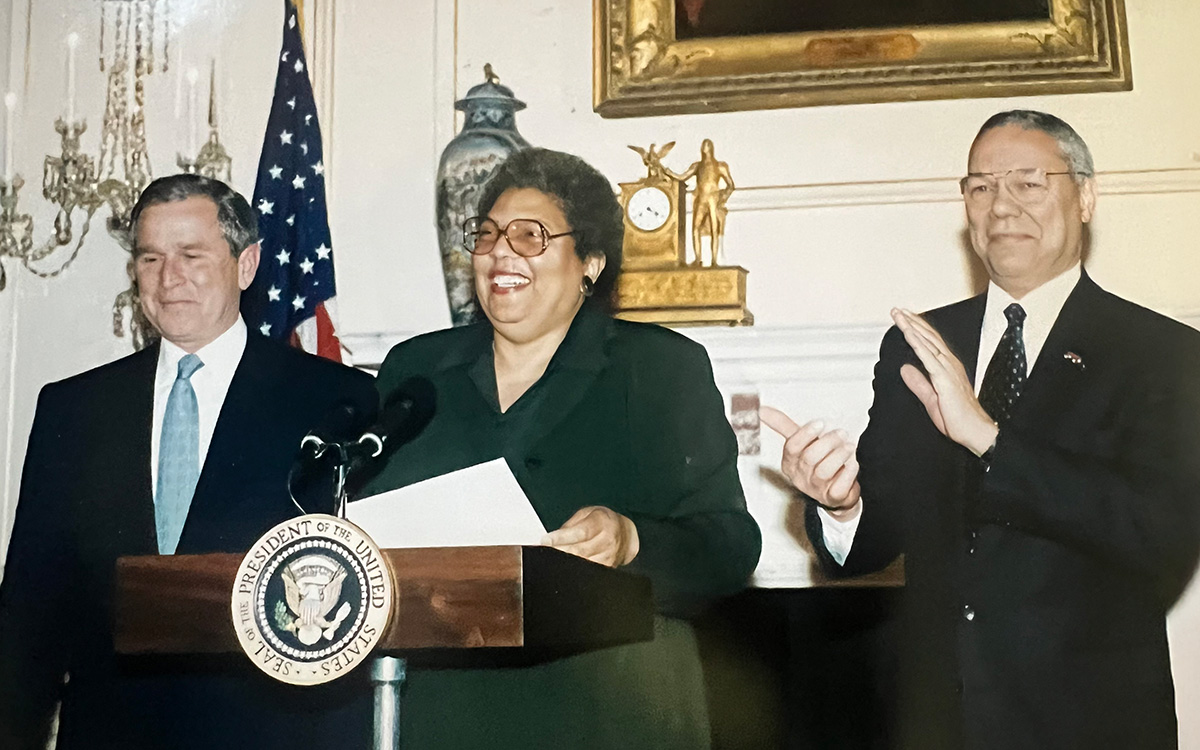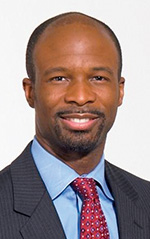Ruth A. Davis, 1943-2025: Remembering a Consummate Diplomatic Professional
BY STACY D. WILLIAMS

Ambassador Ruth A. Davis attends the Thursday Luncheon Group’s Black History Month program on March 2, 2015, in Washington, D.C., where civil rights icon and U.S. Representative John Lewis (D-Ga.) was the keynote speaker. From left: Macon Phillips, Stacy D. Williams, former Deputy Secretary for Management and Resources Heather Higginbottom, Lewis, Davis, and Andrew Aydin.
Michael Gross
On May 28, 2025, more than 800 family members, friends, and colleagues from numerous organizations and affiliations gathered at the National Presbyterian Church in Washington, D.C., to honor the life and legacy of Ambassador Ruth A. Davis. Ambassador Davis, aged 81, transitioned from this life on May 3. Among those offering eulogies during the memorial service were a former cabinet-level official, current and retired U.S. diplomats, representatives from seven organizations, mentees, a protégé, and family members. Condolence letters from former Secretaries of State Condoleezza Rice and Hillary Rodham Clinton were also shared.
It was a fitting tribute to a legend and trailblazer who truly embodied servant leadership through her care, inspiration, and guidance for Foreign Service and Civil Service officers of all levels, positively touching the lives of thousands around the world and across many generations. Recognizing her highly decorated 40-year diplomatic career, in which Amb. Davis reached the highest rank of Career Ambassador, and her long-standing contributions to diplomacy, the American Foreign Service Association had bestowed on Ambassador Davis the 2016 Lifetime Contributions to American Diplomacy Award.
Beginnings
Ruth Amy Davis was born in Phoenix, Arizona, to the late Anderson and Edith Davis, and raised in Atlanta, Georgia. It was there that she was exposed to the socioeconomic and societal challenges imposed by the Jim Crow era. Undeterred by the trials of this period, Anderson and Edith looked to give their daughters, Ruth and Eugenia, a broader experience through travel every summer throughout the United States.
Mr. Davis kept a keen eye on the quality of Ruth’s education and from time to time sat in the back of her classroom. Through his presence, Mr. Davis conveyed to her teachers that this child was special and that he wanted the best for her. During her first job, cleaning the home of a wealthy family, young Ruth Davis was invited to view photos from the family’s vacation abroad. When she expressed her interest in one day experiencing such scenic places overseas for herself, she was told: “These places are not for people like you.” With that, she became determined that she would, indeed, see these places.
Setting Her Sights
During undergraduate studies at Spelman College, Davis received a prestigious Merrill Scholarship to study and travel abroad for 15 months in Europe. While traveling within Europe and the Middle East, she met several young African students interested in nation-building in their newly independent countries. Davis set her professional sights on a career that would give her the opportunity to work with these bright and excited individuals, which led her to the U.S. Foreign Service. After earning a master’s degree in social welfare from the University of California, Berkeley, in 1968, Davis entered the Foreign Service in 1969 and undertook consular assignments in the Democratic Republic of the Congo, Kenya, Japan, and Italy.
During her assignment as consul general in Barcelona (1987-1991), Davis’ entrepreneurial prowess began to take shape. Through her work on the U.S. Olympic Committee for Barcelona’s 1992 Summer Games, she was able to provide support to Atlanta’s bid to host the 1996 Summer Games. Atlanta won, and the games were brought to her hometown, placing it squarely on the international stage.
Her dream from her experience abroad, to help her African interlocutors build economic, social, and political democratic pillars, was realized during her tour as ambassador to Benin (1992-1995). In addition to democracy building, she focused particularly on supporting education for girls.
In each of her overseas assignments except Japan, both her parents visited her. Sister Eugenia, late brother-in-law Jeff, niece Malaika, and nephew Austin joined her in visits to Benin and Barcelona, broadening their world perspectives. As her mother often said: “We showed Ruth the United States, and she showed us the world.”

Ambassador Ruth A. Davis (seated) and Dr. Tom Rowe (kneeling) share a group photo with the 2016 Class of the International Career Advancement Program at the Aspen Institute.
Sandra Rivera
Leadership and Training
With Amb. Davis’ return to Washington, D.C., her iconic status would be solidified and embraced. At a table in the State Department cafeteria, Amb. Davis met with Dr. Tom Rowe of the University of Denver’s Josef Korbel School of International Studies. Shortly thereafter, in 1997, Dr. Rowe established the International Career Advancement Program (ICAP), and Amb. Davis served as a steadfast senior adviser for nearly 30 years.
Each year, a talented group of aspiring mid-level officers from government and members of nongovernmental organizations, nonprofits, and academia would descend on the Aspen Institute in Colorado for a week of career development, engagement with senior advisers, participation in one-on-one mentoring sessions, and networking. The highlight of each annual session was Amb. Davis’ rousing, inspirational, and strategic speech and the engaging question and answer session that followed. Since its inception, 930 ICAP fellows have completed the program and have organically formed peer-to-peer mentoring support across disciplines.
As the first Black director of the Foreign Service Institute (1997-2001), Amb. Davis established the School of Leadership and Management to develop a curriculum that could be used between Foreign Service officer assignments with a focus on leading people, leading change, taking language training, and managing resources. These efforts looked to ensure that the State Department retained a skilled workforce prepared for the future.
With the arrival of Secretary of State Colin Powell in 2001, Amb. Davis’ vision was advanced. Powell made leadership and management training mandatory for both Foreign and Civil Service staff. Shortly after Powell’s arrival, President George W. Bush nominated Amb. Davis as Director General of the Foreign Service (2001-2003), the first Black woman to hold this position.
Secretary Powell reinforced his interest in increasing diversity within the State Department so that it reflects the pluralistic composition of the U.S. population and successfully secured the resources from Congress to do so. Amb. Davis would lead efforts in advancing the department’s Diplomatic Readiness Initiative to increase hiring and training within the Service, but she was confronted with a more immediate challenge: the Sept. 11, 2001, terrorist attacks on America.

Director General Ruth A. Davis is joined by then-President George W. Bush and then-Secretary Colin Powell during a swearing-in ceremony for State Department staff in the Ben Franklin room in 2001.
Stacy D. Williams
Mentoring
Amb. Davis skillfully guided the State Department’s support of its 77,000 Foreign Service, Civil Service, and locally employed (LE) staff in the post-9/11 world. That said, no matter how packed her schedule was as Director General, she prioritized meeting with entry- and mid-level officers on a regular basis. She said: “I need to know them, and they need to know me.” This engagement was relationship building and institution building at its core.
Her oratory skills were unmatched as she established a tagline to highlight her commitment to excellence in international affairs. In all her speeches she would proclaim: “Short of being a multimillionaire, there is nothing I would have rather done with my life than be a Senior Foreign Service officer in the U.S. Department of State.”
Following her retirement in 2009, Amb. Davis remained active in coaching and mentoring, founding and leading multiple international organizations and groups. She was also routinely sought out as a seasoned voice lending credibility to books and documentaries promoting international affairs. She took part in interviews sharing her words of wisdom for the publication of the Young Black Leaders Guide to a Successful Career in International Affairs (2022). She participated in bringing Ebenezer Bassett’s story as the first ambassadorial-level Black diplomat assigned overseas to Haiti in 1869 to light in the 2019 documentary by Christopher Teal, “A Diplomat of Consequence.” Amb. Davis also drafted the foreword for Ambassador Charles Ray’s Ethical Dilemmas and the Practice of Diplomacy (2017).
She had the emotional intelligence, self-awareness, and ability to meet employees where they were throughout her life’s journey and truly served as an inspiration for so many. And just weeks before her passing, when asked what more she would have liked to have done if given the chance, Amb. Davis noted: “I would have liked to have mentored more people.” When her record of success in this area was pointed out, she said simply: “I still wanted to do more.” This is her enduring legacy.
Amb. Davis’ profound impact and her life’s work is being celebrated where it began. Spelman College has established the Ambassador Ruth A. Davis Memorial Endowed Scholarship at Spelman College for students majoring in international affairs. To honor Amb. Davis’ legacy, please consider making an online donation by following the “Make a Gift Today” button at https://bit.ly/Spelman-giving. Please specify your gift is for “Scholarship in Memory of Ambassador Ruth A. Davis.”
When sharing or linking to FSJ articles online, which we welcome and encourage, please be sure to cite the magazine (The Foreign Service Journal) and the month and year of publication. Please check the permissions page for further details.



